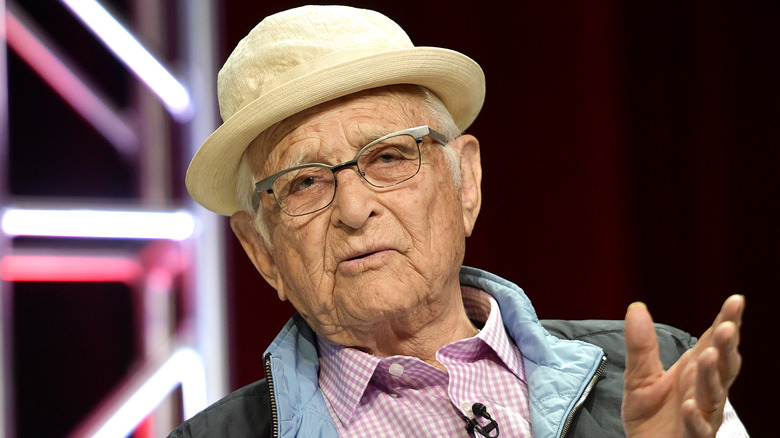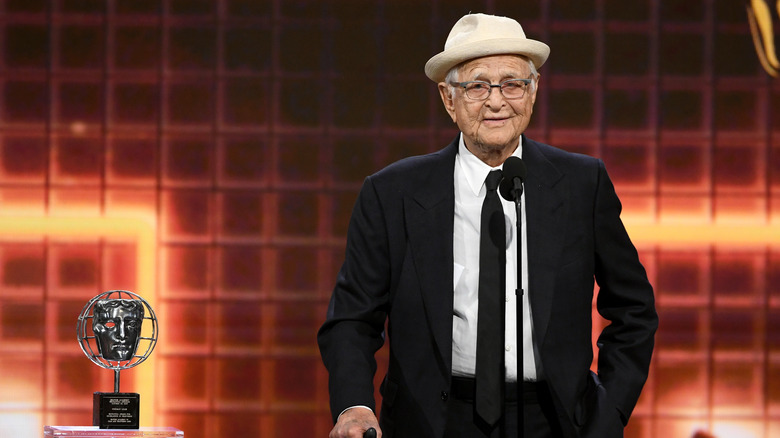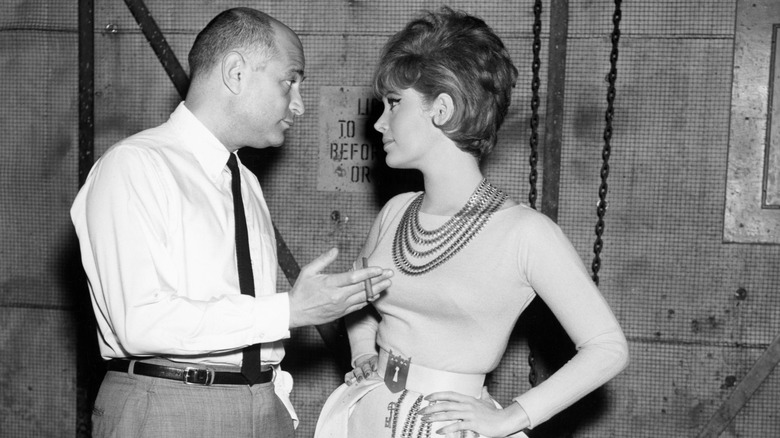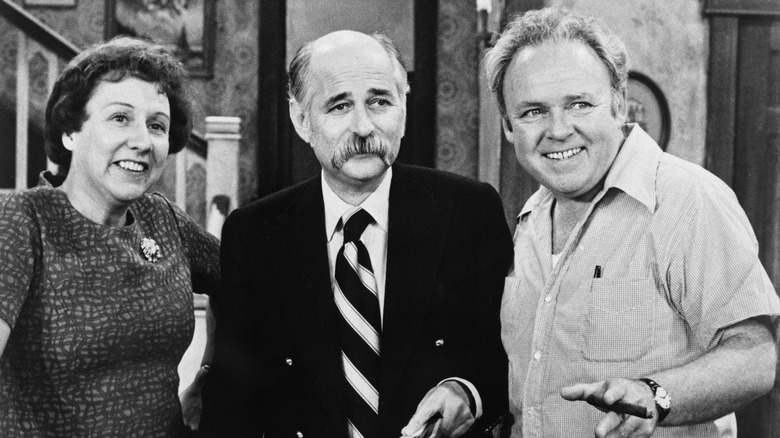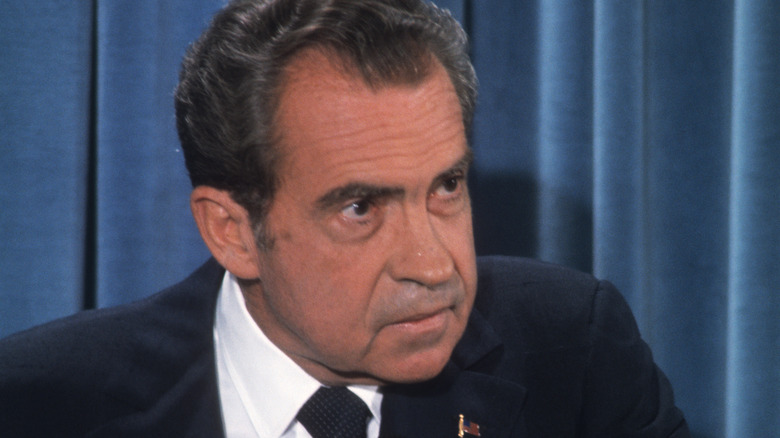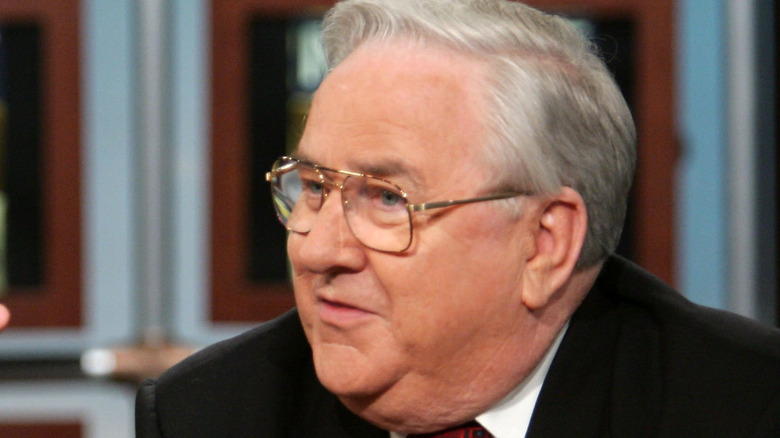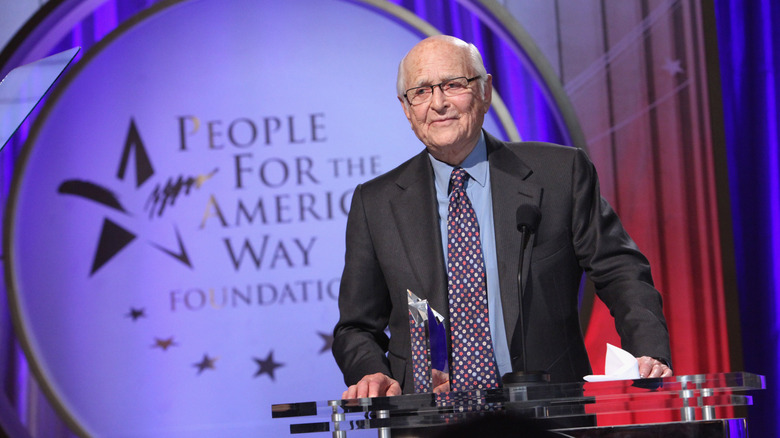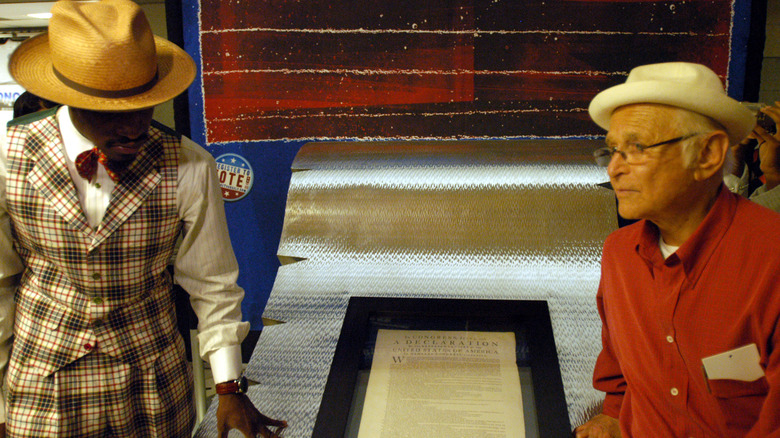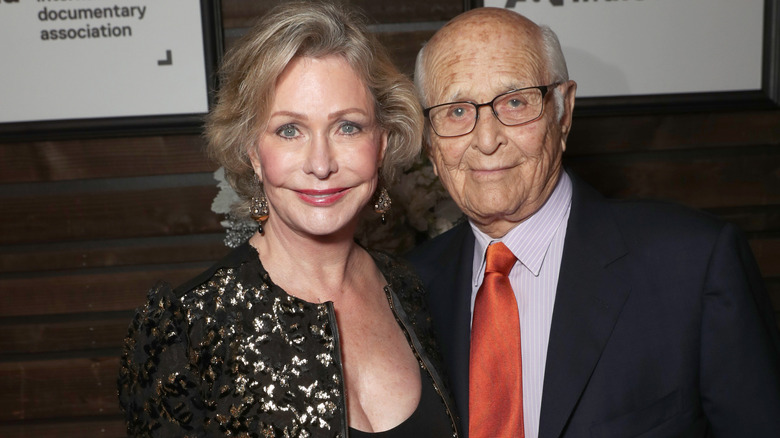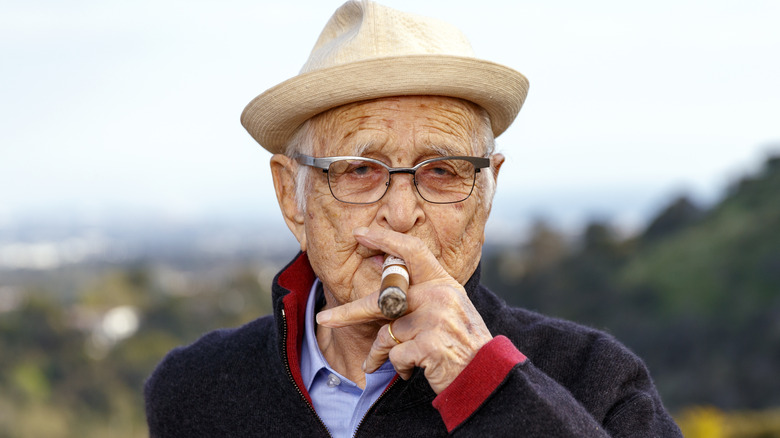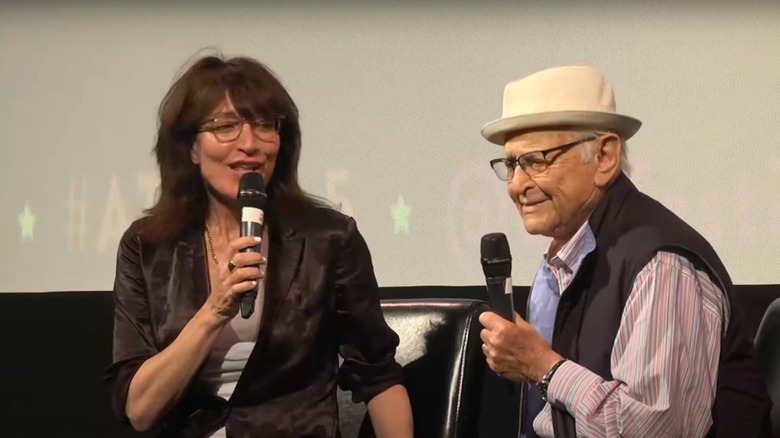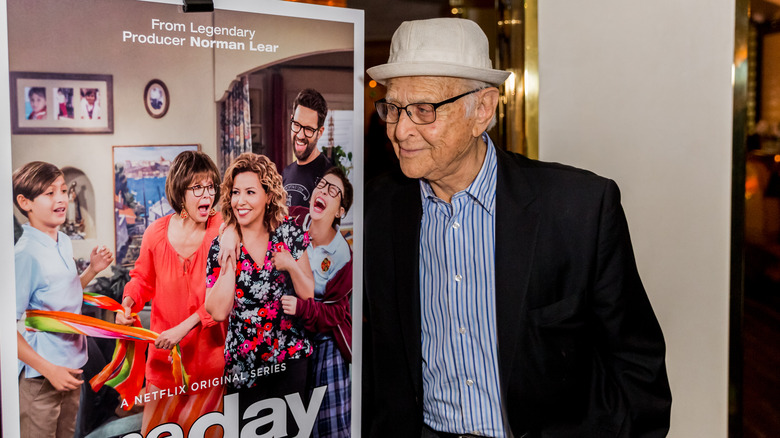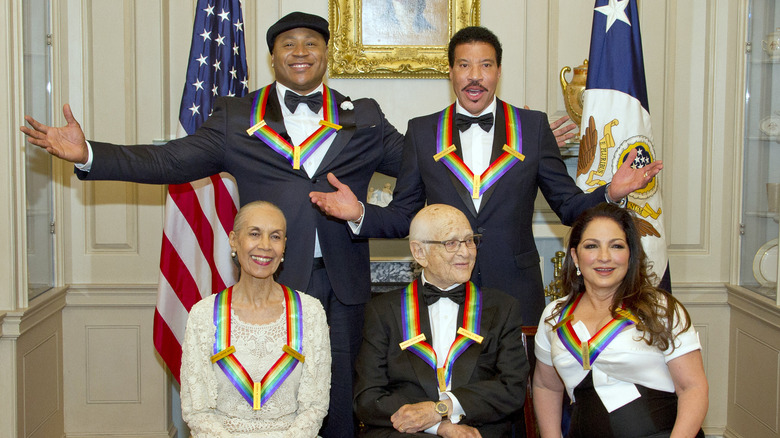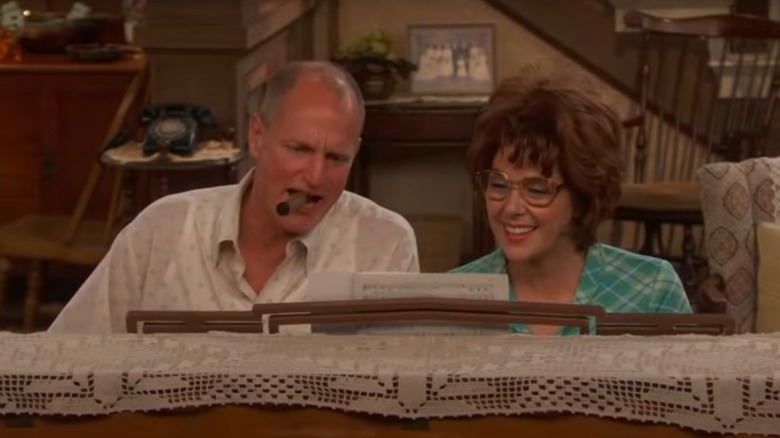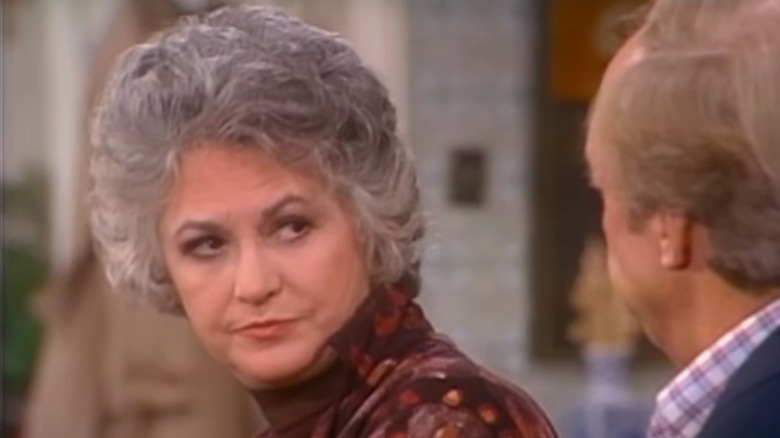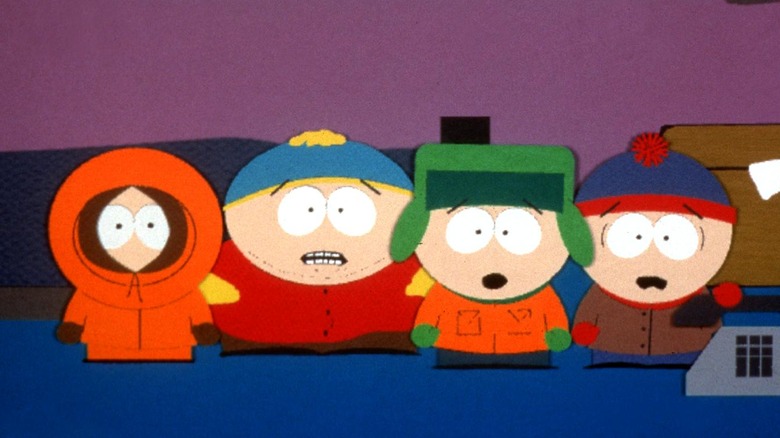The Untold Truth Of Norman Lear
Norman Lear was a TV icon and even those who didn't know him as a household name have certainly heard of his work. Lear — who died on December 5, 2023 at 101 — created such classic TV hits as "All in the Family," "Maude," "The Jeffersons," "One Day at a Time," "Sanford and Son," "Good Times," The Facts of Life," and many more. Lear also produced the beloved 1987 film "The Princess Bride", directed by Rob Reiner — whom Lear first met in the early 1970s when he cast him as Mike "Meathead" Stivic in "All in the Family."
As a television producer, Lear's influence is unparalleled, churning out hit after hit during the course of a career spanning eight decades. During his peak in the 1970s, in fact, Lear could boast of having not just one but several shows in the top 20 of the Nielsen ratings; at one point, nine of his shows were on the air, and he had at least one show on television each year during a period ranging from 1971 until 1986.
Through it all, Lear recognized the enormous influence he wielded, using the power of laughter to open both minds and hearts. His life's work continued right up until the end; when asked by Entertainment Weekly in 2021 whether he had any retirement plans, he quipped, "I think I will be retired, but I will not retire." To find out more about this TV legend, read on to explore the untold truth of Norman Lear.
Norman Lear held an Emmy record
So how did Norman Lear get to the top of Hollywood? It certainly wasn't from family connections. His father, who worked as a securities broker, went to jail when Lear was a boy because he sold fake bonds.
Lear, who was born in New Haven, Connecticut, in 1922, served in World War II before moving to New York City in 1945, where he worked as a publicist and made $40 a week. But this wasn't what Lear wanted to do, so in 1949, he moved to California to work as a comedy writer. The plan worked, and in 1950, he landed a gig writing for the comedy "Ford Star Revue" with Jack Haley. Shortly after, Lear got another writing opportunity on the comedy series "The Colgate Comedy Hour." That was it; Lear had hit the jetstream of Hollywood exposure and he didn't stop working, both as a writer and later as a creator and producer.
Lear's success was life-long and in 2019, at the age of 97, he became the oldest nominee and subsequent winner of an Emmy Award. He then broke his own record when he won another Emmy the following year, at the age of 98. All told, Lear earned a total of 18 Emmy nominations (he won six), with his first coming in 1971 and his last in 2022 — more than half a century later!
Norman Lear made a few movies, and was nominated for an Oscar
While Norman Lear was best known for his groundbreaking work in television, he also had an active career writing movies. Back in 1963, he and Neil Simon co-wrote the screenplay for "Come Blow Your Horn," starring Frank Sinatra and Jill St. John (pictured on set with Lear in the photo above). He followed that up by writing the scripts for 1967's "Divorce American Style" (starring Dick Van Dyke and Debbie Reynolds), 1968's "The Night They Raided Minsky's," and 1971's "Cold Turkey" (in which Van Dyke co-starred with St. John).
After that, he spent the next few decades focused on his wildly successful TV empire, experiencing unimaginable success in the process. Lear did, however, venture back to the big screen in 1987, when he served as a producer on "The Princess Bride," directed by former "All in the Family" star Rob Reiner. He continued to dabble in movie producing over the years, with films bearing his imprimatur over the years including "Fried Green Tomatoes," "Way Past Cool," and the 2021 documentary, "Rita Moreno: Just a Girl Who Decided to Go for It."
And while most people are far more familiar with Lear's work in television than his filmography, those same folks might be surprised to learn that he was recognized for his big-screen work by receiving an Oscar nomination for his screenplay for "Divorce American Style."
Two of his biggest hits were originally British shows
It's fair to say that everything changed for Norman Lear thanks to "Till Death Us Do Part," a British sitcom that most Americans had never heard of. That series focused on Alf Garnett, a working-class bigot who believes the only correct opinion is his and constantly clashes with his liberal son-in-law. "When I read it, I thought, 'Oh my god, my dad and me,'" Lear told the Television Academy Foundation, recalling how he and his father would get into similar arguments. Lear took the concept and adapted it for American viewers. The result was "All in the Family," which became one of television's most successful series ever.
That wasn't the only time Lear drew inspiration from across the pond. As Lear told USA Today, he'd seen raunchy comedian Redd Foxx perform in Vegas and became obsessed with creating a TV series for him, recognizing that toning down Foxx's act and unleashing him on network television would be hilarious, subversive, and successful. As luck would have it, around that same time he was approached by a British TV producer about adapting another Britcom for American television: "Steptoe and Son," about a quarreling father and son who ran a "rag-and-bone" business.
Lear pitched Foxx the concept, and "Sanford and Son" was born. "It was an instant marriage," Lear said of partnering with Foxx. "Not that he wasn't difficult to deal with, but he was funny as hell and that made everything possible."
Norman Lear was on Richard Nixon's notorious 'enemies list'
Hand in hand with the success of "All in the Family" came controversy. When Archie Bunker espoused his old-fashioned views on race, homosexuality, and religion, Norman Lear's intent with the show was to point out how small-minded and ridiculous they were when exposed to the light. At the time, however, there were many Americans who agreed with Archie — including the president of the United States at the time, Richard M. Nixon. When the infamous White House tapes were released, Lear told Democracy Now, he was stunned to hear Nixon discussing his TV show. According to Lear, Nixon was on tape "talking about 'that show that makes fun of a good man.' Those were his words, and he was talking about that Archie Bunker ... "
That was how Lear became one of the many showbiz types to appear on Nixon's "enemies list," joining the likes of John Lennon, Barbra Streisand, and Jane Fonda. In a clip posted by Talking Points Memo, Lear recalled Nixon complaining about one particular episode, in which Archie discovered a longtime friend was gay. "And I'll be — it was the [craziest] thing ... two magnificent, handsome guys and a stupid old fellow and a nice girl ... They were glorifying homosexuality."
Lear theorized that something in that episode had triggered Nixon. "I wonder if the president didn't have a problem with his own sexuality, the way he described those two guys as 'handsome' and 'virile,'" Lear mused.
Norman Lear's political opinions made some enemies
Richard Nixon wasn't the only right-wing figure Norman Lear clashed with due to his political presence. He also embarked on a well-documented war with Reverand Jerry Falwell, founder of the conservative political action organization the Moral Majority. It all started in 1980, when Lear was researching a movie and wound up watching 100 hours' worth of Falwell's "Old Time Gospel Hour." Lear was so alarmed by what he saw that he stopped working on the project and promptly produced a TV commercial warning of the dangers of religious intolerance.
In response, Falwell (pictured above) blasted Lear as an enemy of the American family. "Norman Lear is clearly anti-Christian," Falwell said, as reported by The Washington Post. Falwell didn't try to sugarcoat his contempt for the left-leaning TV producer. "[Lear's] whole vendetta is against everyone who is preaching the gospel," Falwell griped. "I see an anti-Christian, anti-Reagan fire raging in his soul that's caused him to lash out at the president and the Pat Robertsons and Jerry Falwells of the world."
Characteristically, Lear didn't mince words in his response when he fired back at Falwell with both barrels. "There's nobody who knows me who thinks I'm either irreligious or antireligious. I have great concern anytime someone suggests that God smiles on him because he believes a certain way and doesn't smile on me," he declared.
"[Falwell] would have to know, the way he talks about me, that ... to an [antisemite], a wealthy Jew is different from someone else who is wealthy. The Rev. Falwell trades in that in a consistent and smarmy fashion."
He founded a political organization
Norman Lear's dustup with Jerry Falwell inspired him to found People for the American Way. Launched in 1981, the foundation was his response to a rising tide of right-wing political efforts spearheaded by religious zealots who demonized anyone who didn't think, believe, or act like they did. As a Jewish veteran of the Second World War who flew 52 combat missions over Nazi Germany, Lear had witnessed firsthand the perils of that path, and he saw People for the American Way as a way he could push back.
Through the organization, Lear produced TV commercials explaining the importance of America's separation of church and state. He then produced a TV documentary on the subject, "Life and Liberty ... For All Who Believe," hosted by actor Burt Lancaster. He went even further with his 1982 TV variety special "I Love Liberty," a star-studded, flag-waving salute to American patriotism featuring a cavalcade of celebrities, including the likes of Mary Tyler Moore, Jimmy Buffett, Robin Williams, and many more. With highlights including Barbra Streisand singing "America the Beautiful" and a Muppets sketch about the Continental Congress, Lear pulled out all the stops to celebrate an inclusive, freedom-loving America that was a million miles removed from the narrow-minded theocracy envisioned by Falwell and his ilk.
20 years later, during a 2002 interview with "CBS Sunday Morning," Lear looked back fondly on that special. "'I Love Liberty,' it is as blissful a memory as I have," he recalled.
He paid $8 million for a copy of the Declaration of Independence
When a rare original copy of the Declaration of Independence came up for auction in 2000, Norman Lear saw an opportunity to advance his political agenda. He partnered with dotcom billionaire David Hayden to place the winning bid, paying $8.1 million for the document. "It will belong to the American people," Lear said after the purchase, as reported by CNN.
"When David and I agreed to do this, it was with the understanding that Americans would not have to travel to the Archives in Washington or to the institutions around the country, where so very few people see it," Lear told CNN and then revealed his plan. "We intend to travel it across the country because it is the living document that set this nation up. And it lives today, and those words are for everybody. And we want to remind everybody of them."
In 2001, he sent the document on the road in what he dubbed the Declaration of Independence Road Trip; a three-and-a-half year tour that traveled all over the country with the goal of encouraging Americans to exercise their civil rights as Americans and use their power at the ballot box. After the tour's conclusion, in 2004 he placed his copy of the Declaration of Independence on exhibit in Rockefeller Center in Manhattan.
Norman Lear admitted he was 'one selfish cat'
Norman Lear was married three times. In 1943, he married Charlotte Rosen, and together they shared one daughter, Ellen. In fact, Charlotte and Ellen were with Lear when he made the decision to move from New York to California in 1949 to pursue a career in comedy writing, but the couple divorced in 1956.
Lear then married Frances Loeb in 1956, and they shared daughters Maggie and Kate. They divorced in 1985 and made headlines for her $100-million divorce settlement, which the Chicago Tribune reported had been one of the largest settlements at the time. Lear's second ex-wife shared Lear's zeal for activism and took a chunk of those millions to found Lear's, a feminist magazine targeting women over 50 that launched in 1988 and published until 1994.
In 1987, Lear married Lyn Davis (pictured above) and they had three children: Brianna, Madelaine, and Benjamin. The third time was the charm for Lear; he and Davis were still happily married at the time of his death. Back in 2019, the couple spoke with Closer Weekly about the secret to their three decades of marriage. "He's the last of the real romantics. Every morning, he wants to have a kiss when I wake up. It's a nice way to start the day," she said of her husband. Likewise, Lear glowed about his wife, saying, "I love the way she loves me. I'm just one selfish cat!"
Norman Lear's quirky podcast
Norman Lear's talent didn't just encompass TV and movies. He also wrote a book — which makes sense as he started out as a comedy writer. In October 2014, Penguin Books published his memoir, "Even This I Get to Experience." In Lear's synopsis of the book, he explained how he chose the title. Despite his career success, Lear had hit a hard financial point, where he almost had to sell his home. "Having heard that we'd fallen into such dire straits, my son-in-law phoned me and asked how I was feeling," Lear wrote. "My answer was, 'Terrible, of course,' but then I added, 'But I must be crazy, because despite all that's happened, I keep hearing this inner voice saying, 'Even this I get to experience.'"
Lear's success also extended beyond books (and TV, and movies, and producing ... you catch the drift). He also started a podcast called "All of the Above with Norman Lear," boasting A-list guests like Julia-Louis Dreyfus, Antonio Banderas, and Carol Burnett.
The Guardian summed up perfectly what a podcast hosted by Lear was like. "It's obvious that Lear lives by his own podcasting rules. He tells people to 'call in.' He forgets Sigourney Weaver's name. And he bursts into song whenever he feels like it, carrying on so long you can hear the sheer joy he's getting from the moment. Amy Poehler screechingly chimes in, as the guests often do."
He was Katey Sagal's godfather
Another little-known fact about Norman Lear is the unique relationship he had with Katey Sagal, star of such TV hits as "Married ... with Children" and "Sons of Anarchy." Appearing together at the 2016 edition of the ATX Television Festival, Lear explained that he worked with Sagal's mother, and was friends with her father, director Boris Sagal, whose numerous credits include the TV miniseries "Rich Man, Poor Man" and the Charlton Heston sci-fi thriller "The Omega Man." "I introduced your mom to your dad," Lear told Sagal at the beginning of their discussion.
"The lore is, of my life, is that you're my godfather, do you know that?" Sagal asked Lear. "I accept! I love it!" he replied. "That's what my parents always told me, they said, 'He's your godfather,'" Sagal explained.
In an interview with TV Guide, Sagal was asked whether having a director for a dad and Norman Lear for a godfather added an element of pressure to embark on a Hollywood career. "In a weird way it never felt like pressure but more like, 'Oh, this is what I'm going to do,'" she said. "My father really wanted me to be an actor, but I was going to be a singer, so I said, 'No, I'm not going to be an actor.' As it would happen, it worked out more in his favor!"
Norman Lear spearheaded a hit revival of a 1970s hit — while in his 90s
By 2017, it would have been easy to assume that Norman Lear's producing days were well behind him. That assumption proved to be very wrong when Lear — then in his mid-90s — teamed up with writer/producer Gloria Calderón Kellett to reboot his hit series "One Day at a Time," more than 30 years after it went off the air.
The original show focused on a divorced woman raising two teenage daughters; the revamped version featured a Latina single mom, with EGOT-winner Rita Moreno proving to be the series' secret weapon as a sassy grandma. The series ran for four successful seasons, bringing new acclaim to Lear in his twilight years. During a Deadline Q&A panel, Lear was asked how he came up with the idea to revive "One Day at a Time" all those years later. "It came to me the way a lot of ideas come to me," Lear quipped. "Somebody walks in and says, 'Hey, what do you think about ... '"
In an interview for the PBS "American Masters" documentary about him, Lear detailed how quickly it all came together. "The incentive was a conversation with a young associate Brett Miller, and he had a conversation with Sony, who owns my library including 'One Day At A Time,' and they thought it was a great idea," he recalled. "It interested Netflix and they said yes immediately, so we just made the pilot ... "
He nearly boycotted being honored by the Kennedy Center
In 2017, Norman Lear was announced as one of that year's Kennedy Center Honorees, alongside rapper LL Cool J, singers Gloria Estefan and Lionel Richie, and dancer/choreographer Carmen de Lavallade.
However, The New York Times reported that Lear would be skipping the ceremony — because he couldn't bear the thought of being in the same room with President Donald Trump. Given his decades of liberal activism, Lear's opinion of the former "Celebrity Apprentice" star was hardly a surprise. "Archie Bunker was far wiser of heart," said Lear of Trump in an interview with the Daily Beast, adding, "Donald Trump is a thorough fool."
Several of Lear's fellow honorees followed his lead, likewise threatening to boycott the gala. Imagining the optics of the president attending a ceremony boycotted by all honorees because of him, the White House issued a statement, as reported by The New York Times: "The president and first lady have decided not to participate in this year's activities to allow the honorees to celebrate without any political distraction." Lear ultimately attended the Trump-less ceremony but took a hard pass on attending a traditional White House reception with the president and first lady ahead of the event. As he told Variety, his reason was to protest the Trump administration's budget proposal to eliminate the National Endowment of the Arts. "I think the arts are important for our humanity, and that includes this administration," Lear said.
How he came to partner with Jimmy Kimmel for star-studded live versions of his biggest hits
Successfully reviving a successful TV show 30 years after it ended would be quite the coda on the career of any TV producer, particularly one who was pushing 100, as was the case with Norman Lear's hit reboot of "One Day At a Time."
As it turned out, Lear had one more trick up his sleeve. In 2019, ABC announced that Lear was teaming up with late-night host Jimmy Kimmel to produce an unprecedented live TV special. Titled "Live in Front of a Studio Audience," a group of A-list actors was assembled for a live recreation of an "All in the Family" episode — with Woody Harrelson as Archie, Marisa Tomei as Edith, Ellie Kemper as Gloria, and Ike Barinholtz as Mike — in addition to a recreated episode of "Good Times" featuring stars like Viola Davis, Andre Braugher, and Tiffany Haddish.
The project was so well received that a second special was mounted, with the "All in the Family" cast returning for another episode, which ran along with an episode of "The Jeffersons," with Jamie Foxx and Wanda Sykes portraying George and Louise Jefferson. Then, in 2021, a third live special recreated episodes of "Diff'rent Strokes" and "The Facts of Life." The first two specials each won Emmys, while the third earned a nomination.
"It couldn't be more exciting to be revisiting, after all these years, these precious characters with these wonderful actors in the roles," Lear told The Hollywood Reporter of the experience.
The one sitcom character he felt was most like him
Norman Lear created numerous indelible characters during the course of his eight-decade career, but one resonated with him more than any other. "Of all the characters I've created and cast, the one who resembles me most is Maude," he wrote in his memoir, "Even This I Get to Experience," as excerpted by The New York Times. "That's the character who shares my passion, my social concerns and my politics," Lear wrote. "Oh, and as important as all the rest combined, it was Maude who dealt best with the foolishness of the human condition because she knew herself to personify it. Oh, my Maude!"
Originally brought in as a guest star on "All in the Family" as a foil to put Archie in his place, Bea Arthur so nailed the role that Lear immediately realized he had a hit spinoff on his hands. "And we were three days in rehearsal and I knew that I would hear from [CBS programming head Fred] Silverman and others, to let's do a show with this woman," Lear told the Television Academy Foundation.
During a 2020 appearance on "The Kelly Clarkson Show," Lear confirmed that Maude and Edith Bunker were his absolute two favorite characters, and that "Maude" star Bea Arthur so perfectly embodied the character that she brought his original concept to a whole other level. "Maude made me laugh in places in my body I didn't even know existed," Lear confessed.
Norman Lear was a huge fan of South Park
It should come as no surprise by now that Norman Lear lived his life exactly how he wanted, pursuing an eclectic array of interests ranging from comedy to politics. In the midst of all that, Lear wound up becoming close friends with Trey Parker, the co-creator of "South Park." In fact, Lear served as the officiant at Parker's wedding to Emma Sugiyama. Lear has also contributed to episodes of, and once even lent his voice to, "South Park." In 2003, he provided the voice of Benjamin Franklin in the episode "I'm a Little Bit Country."
As Lear told The New York Times in 2003, after his son convinced him to watch an episode, he knew that he'd found kindred spirits in Parker and "South Park" co-creator Matt Stone. ”I couldn't believe what they were getting away with. I thought it was hysterical," Lear said. ”These guys are nuts. But they're also very, very smart. They throw out a lot in very little time.”
So enthralled was Lear with the show's slyly subversive comedy that he got in touch with Parker and Stone, asking if he could pay a visit to their offices to explore the idea of working together. ”We receive many résumés in the mail every day,” Stone joked. ”I said: 'I like this kid. Let's call him in.”'

